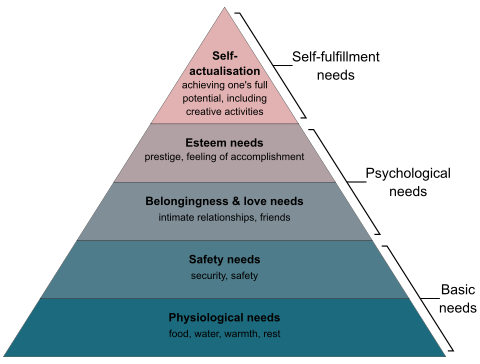How free are we?
by yogthos
Freedom can be seen as the measure of personal agency an individual enjoys within the framework of society. At first glance, it would appear that Canadians enjoy a high degree of freedom since we place very few restrictions on personal rights. However, there is a distinction between having theoretical freedoms and being able to exercise these freedoms in practice.
Freedoms are only meaningful when we have a chance to exercise them and that means having the time to do so. If we look at Maslow’s hierarchy of needs, we can see that time must be allocated towards basic needs before it can be allocated to our self-fulfillment.

We meet these basic needs by doing work, and a typical Canadian works for at least forty hours a week. Meanwhile, the income earned from a typical job is roughly equivalent to living costs spent on food, housing, and other necessities as evidenced by the fact that nearly half of Canadians are 200 dollars or less away from not being able to pay their bills.
An obvious question here is why people don’t get jobs that pay more. Unfortunately, better paying jobs typically require higher education and attaining this education requires having both the time and the finances to do so. If a person is unable to create savings while they’re expected to work full time, then higher education ends up being outside their reach.
Paradoxically, obtaining higher education can make someone’s financial situation worse, where instead of simply not having savings the individual now owes large sums of money to their education institution. According to Statistics Canada, roughly half of the graduates from higher education institutions have debt upon graduation. Turns out that the cost of education can negate the financial benefits of a higher paying job for many people.
Finally, it’s important to note that a forty-hour week is the expected standard in Canada. Even if one is lucky enough to attain higher education without going into debt they will have a difficult time finding a job that does not demand a lion’s share of their time.
The pattern that we see here is that Canadians are expected to spend the majority of their time doing work in order to meet their basic needs while having little time to spend on their own interests. This is true regardless of the quality of work or the level of education the person is able to obtain. This situation constitutes troubling results for the amount of effective freedom that Canadians enjoy.
There are several ways we could combat this problem. The number of hours in the standard work week is not a law of nature, but rather a social contract that can be renegotiated. Other countries already have a shorter work week than what we enjoy in Canada. For example, France has a 35-hour week, and Finland is even considering a four-day work week. There is no reason why Canadians can’t have a shorter work week as well.
Providing universal guaranteed income is another policy that Canadians should demand. Creating a stronger social safety net would dramatically lower the risk associated with switching careers, starting a businesses, or getting higher education. This would directly lead to increased freedoms for Canadians by creating more opportunities for self-actualization.
Reducing the cost of higher education, or making it free, is another demand that we must put to our politicians. Every Canadian should have the ability to develop their interests without having to worry about incurring a financial burden.
It’s time Canadians started thinking about freedom in practical terms, and that starts with having the freedom to choose how we spend our time.
Licensing
The JI Newsletter is licensed under a Creative Commons Attribution-ShareAlike 4.0 International license. If using material from the newsletter, please credit the author and provide a link to the relevant newsletter in your attribution. Any content produced using material from the JI newsletter must be licensed under the same terms.